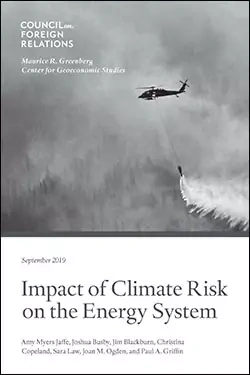
Impact of Climate Risk on the Energy System
Examining the Financial, Security, and Technology Dimensions

Climate change poses risks to energy security, financial markets, and national security. Energy companies and local, state, and federal governments need to better prepare to face these challenges.
- Report
Overview
Climate change affects virtually every aspect of the U.S. energy system. As climatic effects such as rising seas and extreme weather continue to appear across many geographies, U.S. energy infrastructure is increasingly at risk. The U.S. Gulf Coast—which is home to 44 percent of total U.S. oil refining capacity and several major ports—is highly vulnerable to flooding events and dangerous ocean surges during severe storms and hurricanes. The link between water availability and energy and electricity production creates another layer of risk to U.S. energy security.
Climate risk could manifest not only in physical damages, but also in financial market failures. Climate change–related challenges could impede energy firms’ access to capital markets or private insurance markets. Already, climate-related risks have created severe financial problems at a handful of U.S. energy firms, forcing them to interrupt their sales of energy to consumers in particular locations. Over time, climatic disruptions to domestic energy supply could entail huge economic losses and potentially require sizable domestic military mobilizations. The United States is ill prepared for this national security challenge, and public debate about emergency preparedness is virtually nonexistent.
More on:
To explore the challenges of climate risk to the U.S. energy system and national security, the Council on Foreign Relations organized a two-day workshop in New York, on March 18 and 19, 2019. The gathering of fifty participants included current and former state and federal government officials and regulators, entrepreneurs, scientists, investors, financial- and corporate-sector leaders, credit agencies, insurers, nongovernmental organizations, and energy policy experts. During their deliberations, workshop participants explored how climate-related risks to U.S. energy infrastructure, financial markets, and national security could be measured, managed, and mitigated. Impact of Climate Risk on the Energy System summarizes the insights from this workshop and includes contributions from seven expert authors delving into related topics.
This essay collection was generously supported by the Alfred P. Sloan Foundation.
Professors: To request an exam copy, contact [email protected]. Please include your university and course name.
Bookstores: To order bulk copies, please contact Ingram. Visit https://ipage.ingramcontent.com, call 800.937.8200, or email [email protected]. Include ISBN: 978-0-87609-773-1.
More on:
 Online Store
Online Store